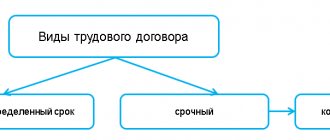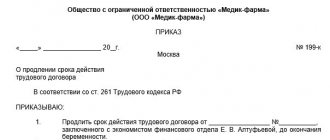A fixed-term employment contract is convenient if an entrepreneur needs to replace an employee who has gone on maternity leave, hire employees for a temporary project, or carry out atypical temporary work, such as reconstruction.
After the fixed-term contract is terminated, the parties are released from their obligations. Only if they didn't make mistakes. We have collected and analyzed the nuances associated with fixed-term employment contracts so that you do not have any problems with this.
If you don’t have time to read the entire article, check out “The Essentials in 30 Seconds” at the end.
Form of an additional agreement on the transfer of a fixed-term contract to an open-ended one
The agreement has a standard form and includes the following mandatory information:
- title of the document (additional agreement No. N on amendments to the employment contract No. N dated dd.mm.yyyy);
- date of drawing up the paper, place of conclusion of the agreement;
- information about the parties to the agreement;
- subject of the agreement (the parties to the agreement agree to change some provisions of the fixed-term employment contract No. N dated dd.mm.yyyy between citizen <A> and company <B> - the employee is hired for the position <B> with a salary, this agreement is considered unlimited with dd.mm.yyyy);
- the previous sections and conditions remain in place;
- details, personal signatures, date of conclusion of the contract.
Responsibility of the employer towards the employee
Important! Part 6 of Article 58 of the Labor Code of the Russian Federation prohibits employers from concluding fixed-term employment contracts with the intention of evading compliance with the rights and guarantees of employees that may occur when concluding a permanent employment contract.
If, during an inspection by regulatory authorities, the employer is unable to confirm the voluntary conclusion of an additional agreement by the employee (detection of a threat of dismissal in case of refusal, or pressure from management), and also if the presence of reasons provided for in Article 59 of the Labor Code of the Russian Federation is not established, which allow transfer from an open-ended employment contract to a fixed-term one, administrative liability may be applied to the employer.
So, according to Art. 5.27 of the Code of Administrative Offenses of the Russian Federation for violation of labor legislation, a legal entity may be fined in the amount of 30,000 to 50,000 rubles; in case of repeated violation, the amount increases from 50,000 to 70,000 rubles.
An individual entrepreneur or an official will also be punished by a fine of 1,000 to 5,000 rubles, in case of repeated violation - from 10,000 to 20,000 rubles, or disqualification for a period of 1 to 3 years (for officials).
Common mistakes
Error: The employer made an entry in the work book about the transfer of an employee from a temporary job to a permanent one.
Comment: It is not necessary to make entries in the work book about the transfer of a fixed-term employment contract to an open-ended one.
Error: The employer drew up an additional agreement to transfer a fixed-term employment contract to an open-ended one, formulating the transfer as “extension of a fixed-term contract.”
Comment: The law does not provide for the extension of fixed-term employment contracts, and therefore it is necessary to designate the transfer of a fixed-term contract to an open-ended one as a “change” and not an “extension”.
The temporary contract became permanent
So, the employee is hired under a fixed-term employment contract for the duration of the duties of the absent employee.
But another position suitable for this employee became available, the employer offered it, and the employee agreed. What will your actions be? First of all, let us remind you that according to Art. 72.1 of the Labor Code of the Russian Federation , transfer to another job is a permanent or temporary change in the labor function of an employee and (or) the structural unit in which he works (if the unit was specified in the employment contract), while continuing to work for the same employer. Transfer to another job is permitted only with the written consent of the employee (exceptions are established in Parts 2 and 3 of Article 72.2 of the Labor Code of the Russian Federation for temporary transfer).
By virtue of Art. 72 of the Labor Code of the Russian Federation, changes in the terms of the employment contract determined by the parties, including transfer to another job, are allowed only by agreement of the parties to the contract, with the exception of cases provided for by the Labor Code of the Russian Federation. An agreement to change such conditions is made in writing.
Part 1 of Art. 59 of the Labor Code of the Russian Federation provides for the conclusion of a fixed-term employment contract for the duration of the duties of an absent employee, who, in accordance with labor legislation and other acts containing labor law norms, a collective or labor agreement, agreements, and local regulations, retains his place of work. At the same time, as established in Part 3 of Art. 79 of the Labor Code of the Russian Federation , this contract is terminated when the absent employee returns to work.
Conditions on the validity period and the circumstances (reasons) that served as the basis for concluding a fixed-term contract are necessarily included in its text ( Part 2 of Article 57 of the Labor Code of the Russian Federation ).
So: labor legislation does not contain a ban on transferring a person working under a fixed-term employment contract to another position with an open-ended employment contract.
The terms of the employment contract, including its validity period, the circumstances (reasons) that served as the basis for its conclusion for a certain period, the employee’s labor function, can be changed by agreement of the parties during the validity period of the contract ( Rostrud Letter No. 4413‑6 ).
The legislation does not establish any specific features for this situation and permanent transfer is carried out in accordance with the general procedure.
Thus, the following documents must be completed:
1. An offer to the employee for a transfer (if the initiator of the transfer was the employer) or an application from the employee (if he was the initiator).
2. Additional agreement to the employment contract, which reflects all the terms of the contract that change during the transfer of a temporary worker (see sample on page).
3. Order on the unified form T-5, approved by Resolution of the State Statistics Committee of the Russian Federation dated January 5, 2004 No. 1 “On approval of unified forms of primary accounting documentation for recording labor and its payment ,” with which the employee must be familiarized with signature.
4. An entry on the transfer of a temporary employee to another position in the work book and personal card of the employee ( part 4 of article 66 of the Labor Code of the Russian Federation , clauses 4 , 12 of the Rules for maintaining and storing work books, producing work book forms and providing them to employers , approved by the Resolution Government of the Russian Federation dated April 16, 2003 No. 225 ).
Additional Agreement No. 2
to the employment contract dated October 28, 2016 No. 23
Kirov 11/10/2018
Municipal budgetary institution of additional education "Raduga" (MBU DO "Raduga"), hereinafter referred to as the "Employer", represented by the director Kalinkin Igor Alekseevich, acting on the basis of the charter, on the one hand, and Novikova Marina Vladimirovna, hereinafter referred to as the "Employee" , on the other hand, guided by the provisions of the labor legislation of the Russian Federation, we have entered into this additional agreement to the employment contract as follows.
1. From November 12, 2021, the employee, with his consent, is transferred from the position of cashier to the position of accountant. I have read the accountant's job description and signed it.
2. Clauses 2.1 and 3.1 of the employment contract dated October 28, 2016 No. 23 should be stated as follows:
– “2.1. This employment contract is concluded for an indefinite period”;
– “3.1. The Employee is remunerated for the time actually worked based on the established official salary in accordance with the staffing table in the amount of 28,000 (twenty-eight thousand) rubles per calendar month.”
3. In all other respects, the employment contract No. 23 dated October 28, 2016 continues to be valid in its previous wording.
4. This additional agreement is drawn up in two copies, one for each of the parties, is an integral part of the employment contract dated October 28, 2016 No. 23 and comes into force from the moment of signing. Both copies have the same legal force.
Signatures of the parties:
Employer: Employee:
Kalinkin /I. A. Kalinkin / Novikova / M. V. Novikova/
I received the second copy of the additional agreement. Novikova, 11/10/2018
Answers to common questions about the transfer of a fixed-term employment contract to an open-ended one
Question No. 1: From what moment does a fixed-term employment contract begin to act as a fixed-term one, if neither the employee nor the employer initiates any changes in working conditions after its expiration?
Answer: In this case, the fixed-term employment contract acquires the status of an open-ended one the very next day after the expiration of the fixed-term contract.
Question No. 2: Can an employer who has forgotten to dismiss an employee at the end of a fixed-term employment contract terminate his employment on this basis later?
Answer: No, in your situation, a fixed-term employment contract has already become an open-ended one, and from that moment on, the employer has the right to dismiss an employee only on the general grounds provided for by labor legislation.
Limitations on the probationary period of temporary workers
To understand whether the employee is liked, the employer sets a probationary period under Art. 70, 71 Labor Code of the Russian Federation. This is convenient: if a person is not suitable, it is enough to give written notice of dismissal three days in advance.
The probationary period is set for a period of up to three months. For the company director, chief accountant and their deputies - up to six months. The probationary clause must be written into the employment contract.
The probationary period is shorter
Temporary workers are also allowed to undergo background checks. But when registering for a position from two months to six months, the probationary period should not exceed two weeks.
Test prohibited
When a contract is concluded for a period of up to two months, testing cannot be established. Therefore, unsuitable specialists will have to be fired under the article.
Some workers have increased protection by law and it is prohibited to check their competence after registration. This also applies to temporary work. The probationary period does not work for pregnant women, women with children under one and a half years old, minors and graduates in the first year of work in their specialty.
When will there be no complaints from an employee?
The main way to prevent dissatisfaction on the part of an employee is to agree with him in advance. For greater security for the company, it is best to draw up an additional agreement three months before the start of the new act. This is due to the fact that the statute of limitations lasts exactly three months in this case. If, after the termination of the employment relationship, a citizen goes to court, the consideration of the complaint will be refused.
The court relies on the fact that since the complaint was not sent for three months, the person was satisfied with everything. The document should reflect the maximum validity period; this will help to extend the validity period as little as possible. In addition, the workload of HR department employees will be significantly reduced. It is important to take into account that if there is an urgent nature, the act must be terminated in the appropriate manner.
Responsibility of the parties
This clause stipulates the liability of the parties towards each other for causing a certain type of damage:
If damage is caused to the organization that provided the work, the Employee undertakes to compensate for this damage in accordance with Labor legislation and other regulations. If damage is caused to the Employee by the organization that provided the workplace, the Employer undertakes to compensate for this damage in accordance with Labor legislation and other regulations. Termination of the agreement does not change the fact that one of the parties is released from liability in the event of damage.
Working days schedule
This paragraph indicates the specific schedule according to which the employee carries out his work activities, as well as the vacation schedule. In the text of the document, such a section is composed as follows:
The employee undertakes to perform work in accordance with the working time schedule. By virtue of this agreement, the working week includes 40 (Forty) hours of working time. The employee has the right to rest, and the Employer undertakes to provide this time. The employee has the right to paid leave, and the Employer undertakes to provide it in accordance with labor legislation.
How to carry out the procedure safely?
Despite the fact that from a legal point of view there is no prohibition on such a transfer, there is no clear permission to establish urgency in relation to an indefinite act. For this reason, lawyers advise taking a safer route - ending the relationship with the employee and rehiring him, but on the basis of a fixed-term agreement. This option of action has its own logic, including the transfer of an open-ended contract to a fixed-term one presupposes the consent of the citizen, but in the case of dismissal and a new job, no problems should arise.
This process will entail additional expenses, including money and time, but at the same time, from the legal side, the transition to a fixed-term contract will be clear.
How does the translation happen?
Despite the fact that practice on this issue is far from clear, the presence of several court decisions indicating the legality of such a translation indicates that the translation is permissible. To prevent the case from falling apart in court, it is necessary to comply with all legal requirements. When forming an additional agreement containing the validity period of the contract, certain restrictions must be taken into account . The following conditions must be met:
- The Labor Code allows the formation of fixed-term agreements;
- it is necessary to obtain consent from the citizen whose contract is being converted from an open-ended one to a fixed-term one;
- The expiration of the act must occur before five years of acceptance into the position.
In this case, the term of work is calculated not from the date of formation of the contract, but from the date of employment in the company. The usual form is used when drawing up, which is secured with the signature of the employee and the seal of the company. Provisions on the validity period of the act must be placed as a separate paragraph. If the previous agreement contains a clause on perpetuity, the additional agreement reflects the same clause, but with adjustments.
Salary
The section on wages records the amount of the employee’s salary:
The employer undertakes to pay monetary remuneration for the employee’s fulfillment of his obligations under this agreement in accordance with labor legislation and other regulations. The amount of monetary remuneration (salary) according to this agreement is 56,000 (Fifty-six) thousand rubles 00 kopecks. Payment of wages is carried out in non-cash form by transferring the amount of money to the Employee’s bank card.







